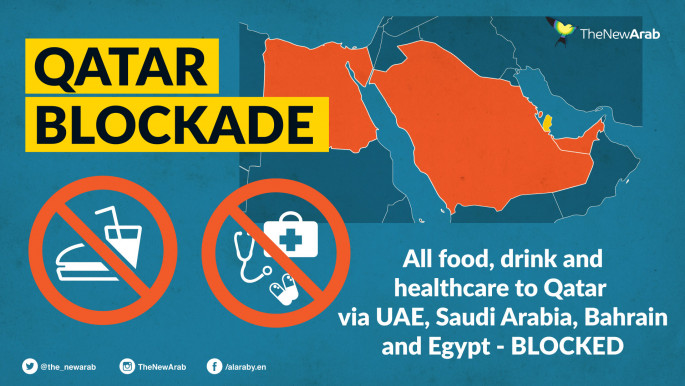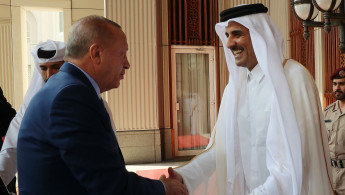Turkey's Erdogan makes 'statement visit' to Qatar ahead of Gulf Cup
Ankara and Doha have grown closer since Saudi Arabia, the UAE, Bahrain and Egypt cut ties with their former Gulf ally more than two years ago.
The bitter rift came over accusations that Qatar supports extremist groups and wants closer links with Iran, the arch-rival of regional powerhouse Saudi Arabia, claims Doha strongly denies.
However, Erdogan's visit comes at a critical time amid signs of a possible breakthrough in the crisis between Qatar and its neighbours - in what could be pushing Ankara to further bolster its political and economic relations with Doha.
Erdogan attended the fifth meeting of the Qatar-Turkey Higher Strategic Committee at the invitation of Emir Sheikh Tamim bin Hamad Al-Thani, the Qatar News Agency reported.
The two countries signed a number of deals during Erdogan's third visit to Qatar since the Saudi-led blockade began in June 2017, which led to rising Turkish influence in Doha.
Erdogan also visited a Turkish military base where around 5,000 troops have been stationed since the Saudi-led blockade amid reports that Qatar intends to buy 100 Turkish tanks.
Speaking at the base, Erdogan suggested a joint force command of Ankara and Doha serves stability and peace for the entire Gulf region, which has seen months of increasing tensions.
"It [Turkey-Qatar Combined Joint Force Command] serves stability and peace of not only Qatar but also the Gulf region," Erdogan said during his visit to Turkish troops in Doha.
The burgeoning relationship saw Turkey's military presence in Qatar increase and Doha pledge economic support to Ankara during last year's currency crisis.
Doha declared its support for Ankara after it launched an offensive on 9 October against a Syrian Kurdish militia, but Arab countries including Saudi Arabia and Egypt have condemned Turkey's "aggression".
'Tough situation'
Andreas Krieg, a professor at King's College London, said the Qataris were put in a "tough situation" when Turkey launched its operation against Syrian Kurdish forces, considered by Ankara to be "terrorists".
Read more: 'A real friend speaks bitter truths': Khashoggi's murder casts a dark shadow on Turkey-Saudi relations
"They acknowledged Turkey's right to defend itself while disagreeing about the means and ways used by Ankara in pursuit of this objective," he told AFP.
"There has been a lot of rumours about this potential disagreement following Qatar-critical coverage in the Turkish press, but in reality there has been no rift in this relationship between Doha and Ankara that is mostly based on a personal relationship between Erdogan and Qatar's Emir."
After the Gulf crisis erupted, Turkey was at the forefront of nations supplying Qatar with food and services, bypassing the blockade imposed by the Saudi-led nations.
Qatar last year announced a $15-billion loan to Turkey's fragile banking sector and also gave a luxury jumbo jet - reportedly worth around $400 million - as a "gift" to Ankara.
The two nations have similar policies over Islamist groups, primarily the Muslim Brotherhood.
Turkey's relations with both Egypt and Saudi Arabia are rocky, and ties between Riyadh and Ankara worsened significantly after Washington Post contributor and regime critic Jamal Khashoggi was murdered in the Saudi consulate in Istanbul on 2 October 2018.
However, the decision by football teams from the Saudi-led bloc to play at a tournament in Qatar could herald a rapprochement.
 |
Meanwhile on Monday, the Saudi and UAE national football teams arrived to compete in the Arabian Gulf tournament in Doha from November 26, despite their nations' two-year boycott of Qatar. Bahrain also said it would take part in the regional cup, prompting analysts to question a possible breakthrough in the Gulf Crisis.
Cinzia Bianco, Gulf Research Fellow at the European Council on Foreign Relations, said Erdogan's visit was "key" at this time.
"Erdogan is trying to make sure that a rumoured Gulf appeasement won't come at the expense of Qatar-Turkey relations," she told AFP.
Gulf crisis breakthrough
The Saudi team flew using the kingdom's national carrier Saudi Arabian airlines directly from the neighbouring kingdom to Qatar, in effect breaking its own two-year air, land and sea blockade on Doha.
The UAE team flew via Kuwait, a route which has been taken by Qatari nationals and residents since 2017, after Qatari airlines were barred from flying through Saudi or UAE airspace.
They are also forced to transit via Oman or Kuwait before landing in blockading states.
Videos posted by the local newspaper Peninsula Qatar showed the 23-man Saudi team receive an official reception at Hamad International Airport before transferring to their residence in a coach branded in the kingdom's green colours.
The UAE received a similar welcome for its team on Monday early afternoon, just hours after the arrival of the Saudi team on Sunday night.
"Welcome all, via sea and land, Qatar welcomes you," lyrics of an official song for the tournament chanted in the background of videos showcasing the reception of the teams.
Confirmation of the the three team's attendance will bring the total number of teams participating in the tournament to eight.
The teams will join Iraq, Kuwait, Oman and Yemen in Qatar.
Writer Jaber al-Harami told The New Arab's Arabic-language service that there are real signs at the moment there could be a breakthrough, with sports as a vehicle to resolving the crisis.
Harami sees a way out of the current deadlock by the next Gulf summit, scheduled to be held in the UAE in December, but believes the first step must be to re-open the borders with Qatar and lift the siege on the emirate.
Academic and former advisor to the UAE's crown prince Abdulkhaleq Abdulla tweeted: "I can share with you that there have been important developments in resolving the Gulf dispute sooner than expected," without specifying further details.
If Saudi Arabia, UAE and Bahrain fans take direct flights from their home countries to Doha - replicating the route of the Saudi team - then this will effectively break the blockade.
When asked about this, Harami said: "Sports fans may be the key to opening the borders and ending the siege."
Earlier this month, Qatar's Minister of Foreign Affairs Mohammed bin Abdulrahman Al-Thani said after a meeting with the US Secretary of State in Washington, that the meeting touched on the Gulf dispute and the Gulf Cooperation Council (GCC) comprising Qatar, Saudi Arabia, the UAE, Bahrain, Kuwait and Oman.
He added that Kuwait's mediation efforts in the Gulf crisis are still ongoing and that Kuwaiti officials had recently visited Saudi Arabia and Qatar.
Last month, the emir of Kuwait told MPs that the 30-month dispute between Qatar and Gulf countries is no longer acceptable and must be resolved.
Sheikh Sabah, who has been acting as a mediator to resolve the dispute, said the "row has weakened our capabilities and threatened our achievements", calling for a negotiated solution.
Follow us on Twitter and Instagram to stay connected





 Follow the Middle East's top stories in English at The New Arab on Google News
Follow the Middle East's top stories in English at The New Arab on Google News
![Netanyahu furiously denounced the ICC [Getty]](/sites/default/files/styles/image_330x185/public/2024-11/GettyImages-2169352575.jpg?h=199d8c1f&itok=-vRiruf5)
![Both Hamas and the Palestinian Authority welcomed the ICC arrest warrants [Getty]](/sites/default/files/styles/image_330x185/public/2024-11/GettyImages-2178351173.jpg?h=199d8c1f&itok=TV858iVg)
